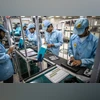Amid concerns over the impact of artificial intelligence (AI) in the job market, Deloitte South Asia CEO Romal Shetty said on Monday that the tool has the potential to create new jobs but some of the current functions involving repetitive tasks may be hit.
“...Where something is repetitive and commoditised, those jobs could be lost but will there be new jobs created, new roles created? Hundred per cent and absolutely,” he said.
More new jobs will be created than in the past given the transformative impact of AI, he assured, adding that human intervention and interface would still play a key role in maximising the benefits of the emerging technologies.
Highlighting the areas where AI has the potential to create jobs, Shetty said that some cases include air traffic control operations for drones, and use of generative AI in electric vehicle related research and development. He said that these reflect that AI is an opportunity rather than an absolute challenge.
Also Read
He further added that while regulations are important, it shouldn’t stifle innovation. Shetty also highlighted that regulations are important in ensuring fairness.
Demand for AI talent to double by 2027
Business Standard had reported in August that the demand for AI talent is set to jump significantly. According to the ‘Advancing India’s AI Skills: Interventions and Programmes Needed’ report released by Deloitte India and Nasscom, said that by the year 2027, the AI market is expected to grow at 25-35 per cent. The report said that the demand for AI professionals is expected to jump to 1,250,000 in 2027 from 600,000-650,000.
More people enrolling in AI courses
At present, AI integration is evident in customer service. As chatbots have the ability to converse with customers in multiple languages, some companies have replaced humans with chatbots.
In July, Business Standard reported that there has been a 50 per cent jump in enrollment in online Artificial Intelligence (AI) and Machine Learning (ML) courses over the past 1 year, signalling growing interest among professionals and their desire to adapt to evolving industry trends.
(With PTI inputs)

)